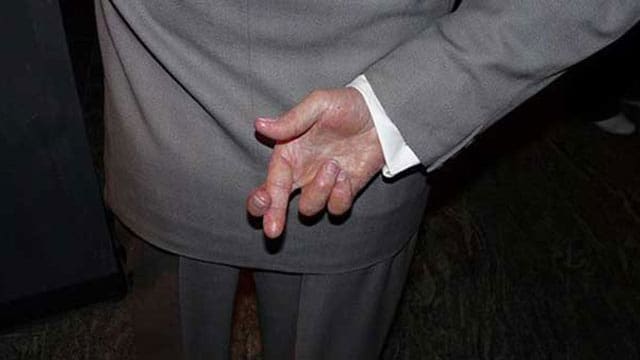These are telltale signs every job interviewer looks for that will give you away
 Call it my spidey senses or “Professionally Ingrained Cynicism;” when someone doesn’t feel right, they just don’t “feel right.”
Call it my spidey senses or “Professionally Ingrained Cynicism;” when someone doesn’t feel right, they just don’t “feel right.”
When you’ve been hiring for as long as I have, you develop an innate sense that tells you when a candidate is exaggerating or lying outright.
Consider these scenarios as a hiring manager:
- A candidate claims to be a cutting-edge CPA. You ask them for their opinion on how blockchain may affect the corporate accounting function and related staffing. They look at you as if you’ve got three heads.
- A candidate’s cover letter promotes themselves as a lead-generating digital marketer. However, when you Google them, you learn that they only have a few hundred X/Twitter followers, haven’t posted on LinkedIn in months, have barely any presence on Instagram, and aren’t on TikTok.
An experienced hiring manager will walk through a candidate’s digital footprint to determine if they’re interview-worthy. If deemed to be, they’ll ask probing questions for their opinions on or a “tell me a time when you” story to expose candidates who aren’t what they claim to be, such as the CPA not being cutting-edge or the digital marketer not practicing what they preached.
 |
I’ve interviewed enough candidates to conclude that many have an overinflated sense of their skills and value to employers. “I have advanced Excel skills” is often untrue when given a test to assess Excel skills. “I speak French fluently” often becomes questionable when I conduct the interview in French.
Fake candidates – candidates who grossly overstate their competencies – are becoming increasingly prevalent, prompting employers to scrutinize a candidate’s background more deeply than ever before.
Your verbal responses and evidence of ability must be aligned.
Today, the hiring process of many employers, not all, presents job seekers with a Catch-22. In today’s job market, employers seek the “perfect candidate.” Searching for a unicorn often makes lies more attractive than truths. Consider how many people buy into get-rich-quick schemes. People tend to believe someone if they can believe they can serve their self-interests, such as making them rich.
Lies and exaggerations are unethical attempts by candidates to tell hiring managers what they believe they want to hear, hoping to convince them they’re the unicorn candidate, hence why my spidey senses tingle when a candidate is excessively polished. The adage “too good to be true” is an adage I live by. I can tell when a candidate is talking to me straight or is rehashing verbiage some self-proclaiming career expert said would influence an interviewer. Having hired my share of Jekyll and Hydes, all tough lessons, I want to avoid a candidate who, once hired, is unrecognizable from the person they were during the hiring process.
In addition to being excessively polished, my spider senses tingle when a candidate is:
- Not giving me straightforward, concrete answers
Dodging my questions or not giving straight answers is evasive, a major red flag. A candidate who’s being evasive irritates me, sometimes to the point of ending an interview early. Besides being aggravating, evasiveness makes me feel the candidate is hiding something or is reluctant to admit they don’t know the answer.
During an interview, you must communicate clearly, straightforwardly, and, above all, honestly.
- Not managing their emotions
For many candidates, their emotions or being easily triggered (read: offended) are their own worst enemies. During an interview, if a candidate can’t control their emotions or maintain their composure, including nervousness (an indication of an inability to cope with stressful situations), I wonder how they’d handle an angry customer yelling.
An interview isn’t the place to bring up your financial and personal struggles. Instead of trying and hoping to make your interviewer feel sorry for you, focus on using examples and numbers to demonstrate why you’d be a great hire.
- Unable to convincingly (keyword) explain why they’re looking to leave their job
If you’re currently employed, your interviewer will ask, “Why are you looking to leave your job?” My spidey senses go off if a candidate’s answer doesn’t feel right.
As someone who’s changed jobs more than most, when asked why I’m looking to leave, I’ve given answers along the lines of:
- Company reorganization or downward trend in the industry.
- Shorten my commute.
These are reasons everyone can relate to. When a candidate says, “I’m looking for more responsibilities and career growth,” I ask myself, why isn’t their current employer giving them more responsibilities? Why aren’t they being promoted?
- Unable to explain job changes
As I mentioned, I’ve changed jobs frequently. Changing jobs to achieve career goals is often necessary, such as when I wanted to experience working overseas. However, your job changes need to make sense. They need to be supporting an end goal. It’s your responsibility to connect the dots and create an overarching career story in your resume, LinkedIn profile, and certainly during an interview. A candidate without a compelling career story makes my spidey senses tingle. I look for candidates looking for a job that’ll contribute to their career story, as opposed to just wanting a paycheck.
Nick Kossovan, a well-seasoned veteran of the corporate landscape, offers advice on searching for a job.
For interview requests, click here.
The opinions expressed by our columnists and contributors are theirs alone and do not inherently or expressly reflect the views of our publication.
© Troy Media
Troy Media is an editorial content provider to media outlets and its own hosted community news outlets across Canada.

